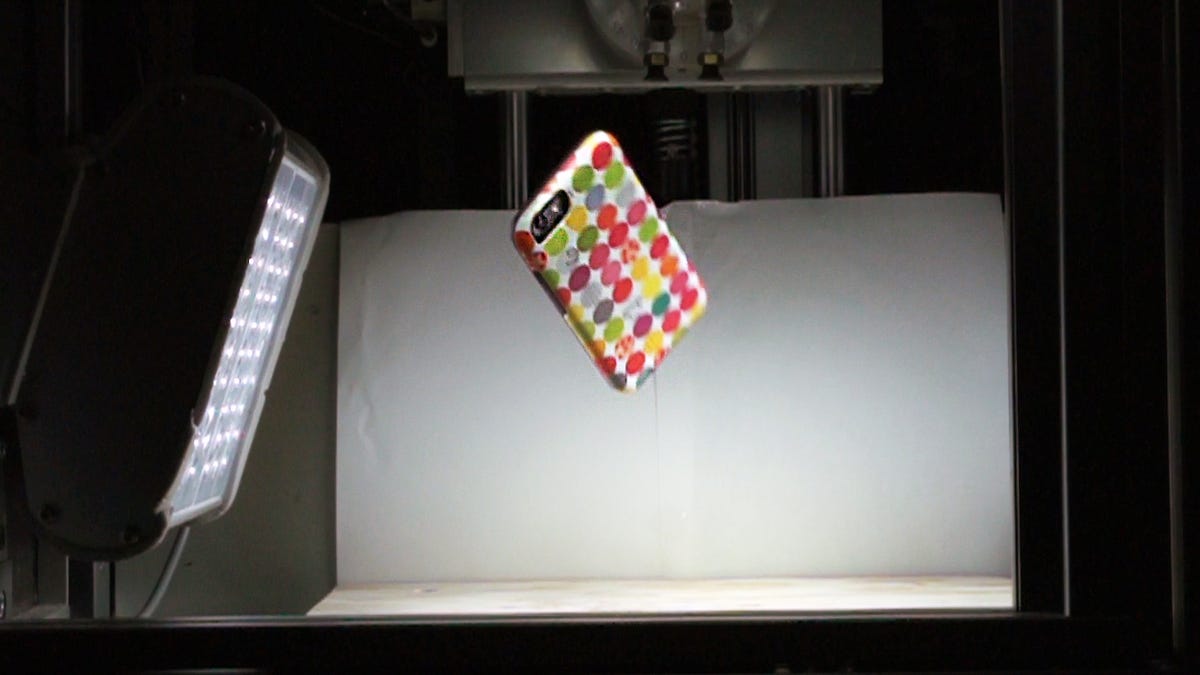If a phone case can survive this torture lab, it can survive anything
The secret behind OtterBox's rugged cases may lie inside the P.I.T., a lab devoted to torturing phones in the worst ways possible.

If you've ever dropped a bare phone on a cement floor, you've probably experienced that nail-biting anguish of turning it over to assess the damage.
At OtterBox, dropping phones is in the job description.
"In meetings, people will drop their phones on purpose", says Paul Staggers, Engineering Manager at OtterBox.
With roughly one third of all phones breaking within 15 months of purchase, according to a study by gadget insurance firm Protect Your Bubble, it's not surprising that the Colorado-based company has made a living off protecting our phones.
The torture chambers
Were it not for the otter toys and statues peering out from every corner, OtterBox's headquarters in Fort Collins could easily pass for one of Silicon Valley's tech playgrounds. Seriously, it even has a lobby slide.
But what really sets its campus apart is the P.I.T (Prototype Innovate and Test), a testing lab designed to put phones and cases through the ringer in a series of contraptions resembling medieval torture devices.
"A lot of it has to do with the normal kind of damage that you would have happen to a cell phone if you didn't have a case on it", says Staggers.
This includes a four-foot drop test from a machine that looks like a phone booth, a tiny tanning booth where the company tests UV exposure to prevent the cases from fading and a thermal shock chamber -- a cross between an oven and a refrigerator, meant to test how cases handle extreme temperatures.
A lot of these tests are industry standards, while others are unique to OtterBox and have been molded after customer horror stories.
"We started analyzing how people live their lives so that it's not just a bunch of people in lab coats that think this will be a good test", says Staggers.
That's how it created the purse test. According to Staggers, the team learned from its customer service department that women's purses were ground zero for phones. Because it had no scientific way of replicating the inside of a purse, OtterBox transformed a Maytag dryer into a purse tumbler. A phone, enclosed in one of the company's cases, gets put into a satchel with a nail file, a hair brush, car keys and other trinkets you'd normally find inside a purse. The satchel then gets put into the tumbler for a total of 100 revolutions with a meter drop at each end.
OtterBox also has a jeans test that looks like a DJ scrubbing a turntable. It's a a machine that rubs a piece of fabric on a case over and over again to mimic two years worth of slipping it inside of your pants pocket.
And if the case or smartphone doesn't survive the P.I.T.?
"We send feedback to engineers, make the necessary adjustments and test again", says Staggers.
Most cases can be ready to ship in as little as eight weeks from the time the engineers receive the information they need from a phone manufacturer.
And when it comes to dealing with the latest iPhone, even OtterBox is kept in the dark. So time is of the essence.
"It's all hands on deck at that point," says Brycen Smith, Engineering technician supervisor. "We get that information the same day as the general public."
The case for modular
But with phones getting tougher, and cases getting cheaper, OtterBox is looking beyond its rugged cases to keep ahead.
This year it launched the Universe series as a response to the modular smartphone trend. Instead of buying a modular phone like the LG G5 and the Motorola Moto Z , the Universe case lets you transform any smartphone into a modular phone by attaching different accessories. Thanks to these add-ons, your phone can become a tripod, bluetooth speaker, wallet, pro-camera or battery pack.
The accessories don't go through the P.I.T., but the case itself is held to the same rigorous testing standards as the rest of the OtterBox products. And because it can't predict the next fad, new smartphone-protection challenges are always around the corner.

